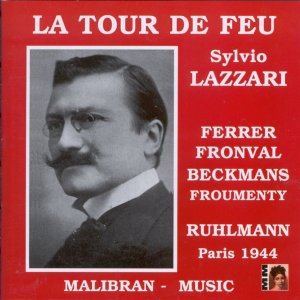Sylvio Lazzari though born in Bozen in the Tyrol became
a fervent Breton. In this joined the ranks of Guy-Ropartz, Cras and
Ladmirault. Lazzari's Symphony is on Naxos (8.554086) and there are
some chamber works on Arion 68360.
His masterwork, the verismo opera, La Lépreuse
(1901), still lacks a recording although the tape (or should I now say,
CDR) 'underground' knows the work from a 1957 broadcast on French radio.
For the record La Lépreuse is set in Medieval Brittany
and is based on a poem by Henri Bataille. Ervoanik loves Aliette who
is believed to have contracted leprosy. Aliette refuses to be his until
the Virgin has granted her recovery from the disease. Later suspecting
that the in fact innocent Ervoanik has been unfaithful she tricks him
into drinking from her glass. He contracts leprosy and the two are banished
from the community to live out their now shared cruel destiny. It is
a fantastic opera and deserves a modern recording. Now that Timpani
have recorded Ropartz's Le Pays that would be an excellent project
for them with Mireille Delunsch as Aliette. But then the world is full
of deserving operatic projects. We have only to think of Rutland Boughton's
deeply emotional The Queen of Cornwall (the Tristan legend as
viewed by Thomas Hardy), another Breton-orientated drama and Canteloube's
Le Mas.
Lazzari's mélodies warrant their own volume
in the Maguelone series. The orchestral music is deserving also. We
could do with recordings of the Rhapsody for violin and orchestra, Spanish
Rhapsody, Nocturnal Cortège, Breton Fête and Lost at Sea.
For now let's turn back to what is available here and
now from Malibran.
This CD preserves a 1944 recording of the lyric verismo
opera La Tour de Feu (The Lighthouse). The ebullient Danses
de la Noce reek with the wheeze of the cornemuse and a dark Breton
tarantelle. The music is volatile, emotional, ripely operatic and opulently
singable. The voices are strong and Lazzari builds some Puccinian confrontational
climaxes which are stylishly and passionately taken by Ferrer and Fronval.
While not specially impressionistic the line of Lazzari's melodies have
some linkages with the writing of Zemlinsky (Traumgörge)
and Korngold (Die Kathrin) but with the textures not so saturatedly
affluent. In this leans Lazzari towards Franck but with much more light
and air in the warp and woof of the music. For a place to sample the
passion of this work try tr. 5 'O-Hé! Yves es-tu là?'.
At times there is a Delian sunset quality to the writing as in Naic's
song 'Me voilà seule, toute seule' and in the wailing of the
choir in the stertorously melodramatic and crashing Finale (tr.11).
The plot turns on the jealousy of the pilot-mariner,
Yann. The object of his desire is the beautiful Naic - who has always
seemed foreign to the Breton island on which the opera is set. Naic
prefers the son of the lighthouse keeper. He is called Yves. The two
marry and at the wedding feast Naic is troubled with unreasoning fears
about going to live at the wooden lighthouse. A ship arrives and Yann
leaves to guide it into harbour. Yan returns with the captain of the
ship, Don Jacinto who is inveigled by Yann into staying to try his seducing
skills on Naic who will be alone on the first day after the wedding
night. Before Naic and Yves leave for their new home Naic agrees to
a meeting with Jacinto. In Act 2 we learn that poor trusting Yves is
refused by Naic on their wedding night. He leaves and Yann appears with
the beguiling Jacinto. A plot is hatched under which the next night
Yann will put out a false distress call, Yves will answer it and while
he is away Naic will join Jacinto aboard his ship. In the third act
Yves, true to plan, leaves when the false call comes in. Yves returns
and after an argument puts out the lighthouse fire intending that Jacinto's
ship will founder on the reef. Naic tries to persuade Yves to relight
the fire but he is obdurate. Naic sings in an effort to warn Jacinto's
ship. In a flash of lightning amid the gathering storm (depicted in
the prelude tr. 8) Jacinto's ship is glimpsed hitting the reef and foundering.
Naic in operatic despair throws herself to her death from the top gallery
of the lighthouse. Yves demented by loss and guilt rekindles the warning
fire and sets the tower ablaze. He dies in the conflagration - echoes
of Hansonís Merry Mount here.
The notes are in French and English and are by Jean
Ziegler. There is no libretto but a reasonably full synopsis. The booklet
is decked out with handsome archival photographs of the singers Charles
Fronval, José Beckmans, Marisa Ferrer, François Ruhlmann.
There are two of the composer.
There are 12 tracks on this CD. Eleven are devoted
to the opera - although I am not clear whether these are extracts or
the whole thing. The twelfth track is a different performance of Naick's
Ballade sung by Jacqueline Courtin. Courtin is grand-sounding but
Ferrer better captures the otherworldliness of Naic.
The 1944 recording which is surprisingly quite presentable
in no-nonsense mono without distortion is from the Collection Tendil-Dumazert.
It vividly preserves a performance made within months of the liberation
of Paris and the revenge that followed. We should be grateful to Malibran
for their work in refurbishing this example of Gallic verismo.
Rob Barnett
